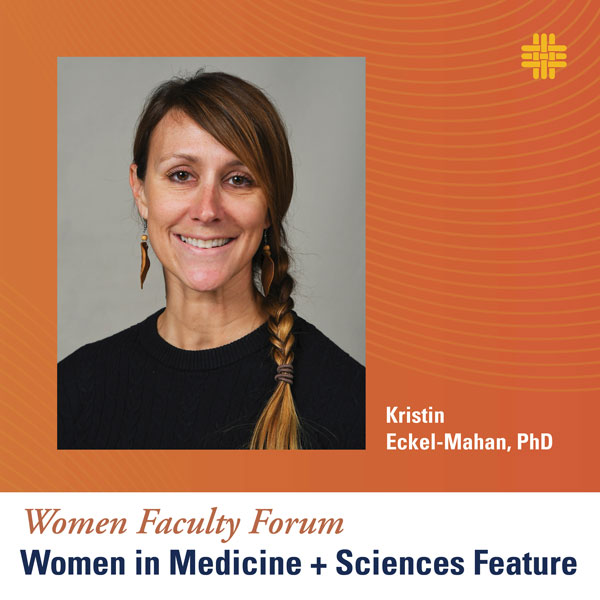Women in Medicine & Sciences Feature: Kristin Eckel-Mahan, PhD

Each month, the Women Faculty Forum presents its Women in Medicine and Sciences Feature, highlighting the women faculty at McGovern Medical School who are leaders in medicine, research, and education.
This month’s feature is Kristin Eckel-Mahan, PhD, associate professor in the Center for Metabolic and Degenerative Diseases at the Brown Foundation Institute of Molecular Medicine.
What is your background? When did you join UTHealth Houston?
Though I was born in Madison, Wis., where my father did his medical internship, I lived my early life in Seattle. I moved to Denver for grad school, and went to the University of Colorado at Boulder for undergraduate studies. I moved back to Seattle, where I acquired my PhD in pharmacology. I did a postdoctoral fellowship at the University of California in Irvine from 2008-15 and joined UTHealth Houston in May of 2015.
What inspired you to pursue a career in science?
My father was a physician scientist who had tremendous enthusiasm for using science to address mechanisms underlying human disease. In high school and college, I was given the opportunity to work in his and other research laboratories and found that scientific discover with a purpose was extremely exciting and fulfilling. Watching other scientists with similar enthusiasm only spurred my interest in becoming a scientist.
Like many others, watching a loved one suffer from disease was also a driving factor in becoming a scientist. My mother was diagnosed with metastatic brain cancer at age 37 and passed away from the disease in her mid-40s. Faced with wondering why several pharmacological approaches did not better treat her disease, my desire to perform basic research to better understand disease and disease treatment was fortified.
What are the primary research interests that drove your career, and what are you pursuing now?
Almost all organisms have 24-hour physiological rhythms that are in sync with the earth’s rotation on tis axis. My interest in biological rhythms began in graduate school when my animal behavior studies revealed a clear time-of-day effect in my behavioral readouts. These observations led to an understanding of the pronounced effect of the hippocampal circadian clock on learning and memory.
Increasingly intrigued by the importance of sleep on memory, I began studying the importance of cellular 24-hour rhythms on tissue-specific function more broadly. Growing evidence from human and pre-clinical studies unequivocally links 24-hour rhythm disturbances to metabolic diseases, and this is what my laboratory is pursuing now. We want to know why the circadian system protects against disease and whether enhancing our rhythms can prevent or delay the progression of specific metabolic diseases.
Who are your role models?
I am fortunate to have had many positive role models in my life. One role model is my father, who worked many a Saturday or Sunday afternoon seeing patients or writing grants, though still made time for family.
I have several female mentors who also stand out, modeling not only hard work, but a passion for science and love for others. One of these is Dr. Frances Sladek (University of California, Riverside), who discovered the HNF4a gene as a postdoctoral fellow. She has encouraged me in many ways, most importantly by demonstrating a life of performing rigorous sciences, while reserving time and energy for her family.
Another role model of mine is Dr. Emiliana Borrelli (University of California, Irvine), an outstanding neuroscientist, and the wife of my late postdoctoral adviser, Paolo Sassone-Corsi (also a role model). She sets such a good example of loving what you do and doing what you love. She has shared many insightful thoughts with me throughout the years.
I often marvel that these women (and many others) started their careers in science when life in the laboratory and in the classroom looked a lot different than it does today, in terms of female representation and engagement.
What do you enjoy most about working at UTHealth Houston?
I love the collaborative nature of the scientific community at UTHealth Houston. A day doesn’t go by that I am not thankful that I started my laboratory here. The supportive and collaborative environment at UTHealth Houston aided me in getting my independent scientific career started, and I am grateful for the many basic science and clinical collaborators I have here. The resources at UTHealth Houston are also outstanding.
How do you think UTHealth Houston can further support female faculty?
I think that UTHealth Houston should continue the trajectory it is on in terms of supporting female faculty. I have found tremendous support here, and part of that comes from direct engagement and mentoring by more established male and female investigators. The personal interactions have been particularly important for my career development, and I can think of specific members of the UTHealth Houston faculty who have served an important role of adviser and mentor for me.
If you would like to nominate a faculty member for the Women in Medicine and Sciences Feature, click here.